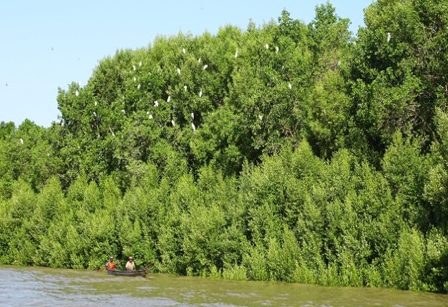
Mangrove Capital Africa: one step closer to mangrove conservation in Rufiji delta
-
Aquaculture, fisheries and coastal agriculture
-
Coastal resilience
-
Integrated delta management
The Rufiji Delta in Tanzania is home for mangrove forests, rich in biodiversity and important source of livelihood for the communities living there. Unfortunately, it has fallen victim to heavy exploitation and degradation. Outdated management plans and policies for conservation are also responsible for this downturn. As a part of Mangrove Capital Africa and as the first and foremost step to start our work there, Wetlands International has developed baseline studies for the programme on the basis of its understanding of the area’s ecological and socio-economic contexts. This has been done through participatory assessments on hydrological and ecological functions of the Rufiji delta ecosystem as well as relevant socio-economic factors, legal, policy and institutional frameworks, and stakeholder mapping and analysis.
The baseline study is enriched by a number of different researches and activities. Firstly, a draft baseline study has been developed that includes researches on the value of the mangrove ecosystem services in Rufiji Delta, their economic significance to the Tanzanian economy as well as an assessment of the conservation and management plan for Rufiji mangroves. Then, on 18th September 2018 Wetlands International Tanzania Office hosted a National Mangrove Stakeholders workshop, bringing important stakeholders from diverse sectors together. For four days these experts reviewed the key findings of the baseline studies which was followed by the development of a roadmap for the Rufiji Delta Management plan.

Among the gaps identified in the current management plan are its outdated method and lack of community involvement/participation; various unaccommodating reforms and changes in the national policies, emerging negative issues and so on. Amina Juma from Kenya Marine and Fisheries Research Institute shared the experience of developing Kenya National Mangrove Ecosystem Management plan 2017, which provided an opportunity for the Tanzania and Kenya teams to share their best practices and lessons learned, and eventually to draft a roadmap for an improved management plan for Rufiji delta.
Mangrove Watch Africa programme, a subset of Mangrove Capital Africa, has also contributed to the baseline studies with the highest quality mangrove maps it produced for Africa. These are the most accurate mangrove maps ever on the biomass, height, and other features of mangroves as well as the changes in mangrove extent and population. The maps will help in reviewing and implementing the new conservation management plan but also in identifying illegal logging, which was previously impossible due to limited resources. This knowledge will also support practices on the ground and build awareness and capacities of partners and other stakeholders.

While speaking at the workshop, Mr. Zawadi Mbwambo Director of resource management, Ministry of Natural Resources and Tourism of the Republic of Tanzania, lauded Wetlands International for their efforts to conserve the Rufiji mangroves and provide a platform for the stakeholders to work together for the same cause. He also urged the authorities to work with the communities and help them reduce their dependence on the mangrove resources by introducing alternative livelihood opportunities.
“Analyses such as these, where the value of the environment and ecosystem services are factored in, are essential for understanding opportunities and trade-offs for the sustainable management and development of the Rufiji Delta. We are glad to share with you the baseline study reports which provide evidence to inform management planning of Rufiji Delta. These reports send some strong and important signals on the conservation of the mangroves, and we hope that it helps to inform your decisions and provides legitimacy for your efforts. Wetlands International will continue to be a strategic partner and support conservation efforts such as the development of the Rufiji Management plan” said the Wetlands International East Africa Director Julie Mulonga.
Some highlights from the baseline studies:
- Ecological: According to the studies the ecological resources in the Rufiji delta are under threats posed by both anthropogenic and natural causes. Anthropogenic causes include unsustainable harvesting, rice farming and the change in water flow caused mainly by upstream farming activities. Natural threats, caused by climate change, include the rise in sea-level, severe drought and heavy rainfall.
- Socio-economic: Obstacles to sustainable livelihoods like inadequate social services, poor infrastructural development and inadequate substantial income generating activities also have many negative impacts on the mangrove ecosystem. Both mangrove and fish resources are highly threatened by increased population and therefore, overexploitation of these resources. Unplanned farming within mangrove forests and unsustainable mangrove business are also key threats. The study concludes that livelihood diversification will provide an opportunity for climate adaptation and reduce dependence on mangrove resources. Enhanced engagement of local communities in the implementation of various initiatives has also been identified as one of the measures to ensure sustainability of planned initiatives, as it enables the programme to capture the local interests.
- Legal, policy and institutional frameworks: Tanzania Forestry Services Agency (TFS), an agency under the Ministry of Natural Resources and Tourism (MNRT) is in charge of the mangrove forests in this area. The natural resources here are protected by different sectoral policies and the Forest Act, No. 14 of 2002 is vital in this respect. Keeping this context in mind, the studies emphasise that the management plans must be prepared through the participation of villagers and other relevant stakeholders to ensure its sustainable and proper implementation.
- Stakeholders mapping and analysis: There is a wide range of stakeholders in the programme area and their interests can be different depending on the nature of activities in the region. This also suggests that the impacts they leave on mangrove ecosystem and its conversation initiatives may also differ from one stakeholder group to another. This stakeholder information is key to avoiding duplication of efforts and increasing the chances of success to ensure sustainable management of mangroves in the Rufiji delta.
